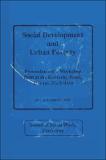| dc.contributor.author | Ngwneya, Barbara N. | |
| dc.contributor.author | Mudede, Tracey | |
| dc.coverage.spatial | Botswana. | en |
| dc.date.accessioned | 2016-06-22T14:41:17Z | |
| dc.date.available | 2016-06-22T14:41:17Z | |
| dc.date.issued | 1993-02-22 | |
| dc.identifier.citation | Ngwenya, B. and Mudede, T. (1993) Rethinking fieldwork education and practice in Southern Africa: lessons from Botswana. In: Hall, N. (ed.) Social development and urban poverty: papers presented at a workshop on urban poverty held at Kentucky Hotel, Harare, 22nd - 26th February, pp. 95-103. Harare: SSW. | en |
| dc.identifier.uri | https://opendocs.ids.ac.uk/opendocs/handle/20.500.12413/11779 | |
| dc.description | A conference paper on the education of social worker's' fieldwork practice in Botswana. | en |
| dc.description.abstract | The purpose of this paper is not so much to critique what is currently the practice of fieldwork in southern Africa in general, and in Botswana in particular. Major discussions regarding the role of fieldwork education in the context of a developing country have been debated at length by several authors (Kaseke, 1986; Muzaale, 1988; Ankrah, 1986; Hall, 1990, Njau, 1986). The main focus of this paper, therefore, is to consider, from a developmental and organisational perspective, ideally what ought to become offield education with particular reference to Botswana. This approach to field education, obviously, does not suggest a blueprint, but rather a working framework for contextualised fieldwork education in Botswana. The approach is therefore tentative and exploratory.
An attempt will be made to map out a plausible alternative to fieldwork education for Botswana. Logically, the practice of fieldwork cannot be divorced from the dominant social work education methodology and issues pertaining to the Department of Social Work’s “organisational competence”. The bottom line, however, is that social work education in Botswana lacks structural cohesiveness as a necessary condition to spearhead a unity of purpose and a sense of community among all those with a stake in it (that is, practitioners, educators, students and client constituencies). The practice of fieldwork, therefore, is conceptualised as positing plausible opportunities for organised and purposeful social involvement based on the principle of: social work for development with equality and justice. The focus of fieldwork, we argue, should be woven around the production and the delivery of services to communities by those who have a major stake in the process, specifically, social work students and educators. | en |
| dc.description.sponsorship | Overseas Development Administration, British Development Division, Central Africa; British Council. | en |
| dc.language.iso | en | en |
| dc.publisher | School Of Social Work (SSW) , University of Zimbabwe (UZ) | en |
| dc.rights.uri | http://creativecommons.org/licenses/by-nc-nd/3.0/ | en |
| dc.subject | Education | en |
| dc.subject | Social Protection | en |
| dc.title | Rethinking fieldwork education and practice in Southern Africa: lessons from Botswana | en |
| dc.type | Book chapter | en |
| dc.type | Conference paper | en |
| dc.rights.holder | School of Social Work (SSW), University of Zimbabwe (UZ) | en |


